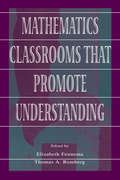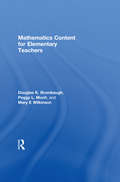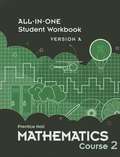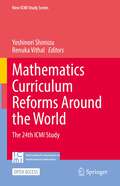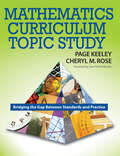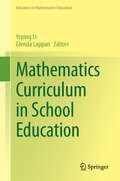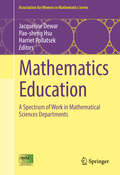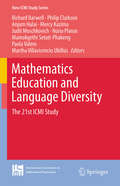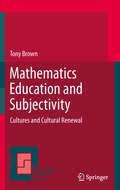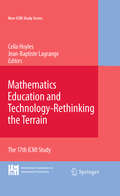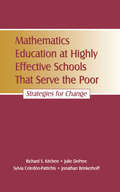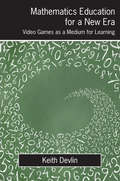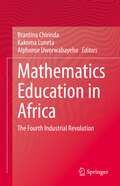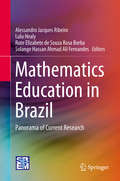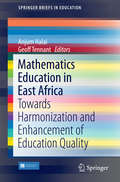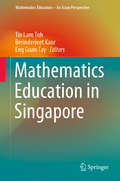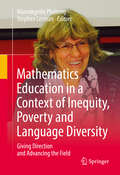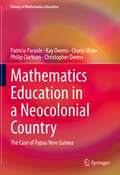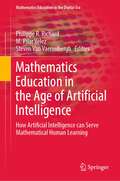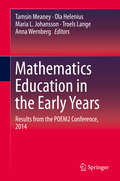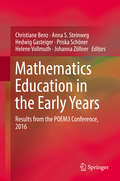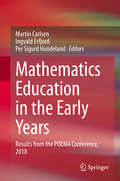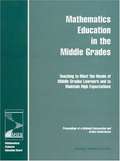- Table View
- List View
Mathematics Classrooms That Promote Understanding (Studies in Mathematical Thinking and Learning Series)
by Elizabeth Fennema Thomas A. RombergMathematics Classrooms That Promote Understanding synthesizes the implications of research done by the National Center for Research in Mathematical Sciences on integrating two somewhat diverse bodies of scholarly inquiry: the study of teaching and the study of learning mathematics. This research was organized around content domains and/or continuing issues of education, such as equity and assessment of learning, and was guided by two common goals--defining the mathematics content of the K-12 curriculum in light of the changing mathematical needs of citizens for the 21st century, and identifying common components of classrooms that enable students to learn the redefined mathematics with understanding. To accomplish these goals, classrooms in which instruction facilitated the growth of understanding were established and/or studied. This volume reports and discusses the findings which grew out of this research, and subsequent papers and discussions among the scholars engaged in the endeavor. Section I, "Setting the Stage," focuses on three major threads: What mathematics should be taught; how we should define and increase students' understanding of that mathematics; and how learning with understanding can be facilitated for all students. Section II, "Classrooms That Promote Understanding," includes vignettes from diverse classrooms that illustrate classroom discourse, student work, and student engagement in the mathematics described in Chapter 1 as well as the mental activities described in Chapter 2. These chapters also illustrate how teachers deal with the equity concerns described in Chapter 3. Section III addresses "Developing Classrooms That Promote Understanding." The knowledge of the teaching/learning process gained from the research reported in this volume is a necessary prerequisite for implementing the revisions called for in the current reform movement. The classrooms described show that innovative reform in teaching and learning mathematics is possible. Unlike many volumes reporting research, this book is written at a level appropriate for master's degree students. Very few references are included in the chapters themselves; instead, each chapter includes a short annotated list of articles for expanded reading which provides the scholarly basis and research substantiation for this volume.
Mathematics Content for Elementary Teachers
by Douglas K. Brumbaugh Peggy L. Moch MaryE WilkinsonTHE book for elementary education mathematics content courses! Designed to help prospective teachers of elementary school mathematics learn content beyond the rote level, this text stimulates readers to think beyond just getting the problem right and fosters their development into thoughtful, reflective, self-motivated, life-long learners. It stresses the what and why of elementary school mathematics content. Hints are provided about how to teach the content but this is mostly left to courses and texts that are dedicated to that purpose.The text is organized around the National Council for Teachers of Mathematics' Principles and Standards for School Mathematics. The Standards dictate the basic sections of the text. Within each section, appropriate specific topics are developed, intertwined with technology, problem solving, assessment, equity issues, planning, teaching skills, use of manipulatives, sequencing, and much more. In addition, major focal points of the Standards are emphasized throughout: effective teachers of mathematics should be able to motivate all students to learn, should understand the developmental levels of how children learn, should concentrate on what children need to become active participants in the learning environment, and should be engaged in ongoing investigations of new mathematical concepts and teaching strategies.Mathematics Content for Elementary Teachers is based on several fundamental premises:*The focus of mathematics education should be on the process, not the answer.*Elementary teachers should know the mathematics content they are teaching, know more than the content they are teaching, and teach from the overflow of knowledge.*It is important for teachers to be flexible in allowing students to use different procedures--teaching from the "overflow of knowledge" implies knowing how to do a given operation more than one way and being willing to examine many different ways.*Teachers need to learn to carefully cover the topics to be taught, to reflect upon them, and to be able to organize them. To help prospective elementary teachers concentrate on the mathematics content they will be expected to teach and begin to build the foundation for the methods they will use, this text includes only elementary mathematics content and does not address middle school concepts.Pedagogical features:*The text is organized according to NCTM Standards.*An informal writing style speaks directly to readers and is geared to pre-service teachers.*Focus is given to multiple methods of problem solving at four developmental levels.*Questions, exercises, and activities are interspersed throughout each section rather than gathered at the end of each chapter.*Complete solutions for exercises are provided.
Mathematics Course 2 All-In-one Student Workbook Version A
by Prentice HallCourse 2 consists of a structured approach to a variety of topics such as ratios, percents, equations, inequalities, geometry, graphing and probability. Test Taking Strategies provide a guide to problem solving approaches that are necessary for success on standardized tests. Checkpoint Quizzes assess student understanding after every few lessons. Daily Guided Problem Solving in the text is supported by the Guided Problem Solving worksheet expanding the problem, guiding the student through the problem solving process and providing extra practice.
Mathematics Curriculum Reforms Around the World: The 24th ICMI Study (New ICMI Study Series)
by Renuka Vithal Yoshinori ShimizuThis Open Access volume by the International Commission on Mathematical Instruction (ICMI) is an outcome of the ICMI Study 24 and gives a status-quo of school mathematics reform around the world and what we can learn from this movement. Each theme and section of the book offers descriptions and analyses of multiple case studies in different countries and contexts, along with opportunities to compare, contrast and learn from these diverse experiences. The volume provides a synthesis and meta-analysis of the different historical, geographical and global aspects of school mathematics reforms and explores in which way curricula are elaborated, proposed, changed, and reorganized. It offers a more informed and comprehensive analysis of the roles of different actors and of the many aspects influencing and shaping mathematics curriculum reforms that are taking or have taken place. It also explores the possibilities and means to tackle a curricular reform in the current scenario we livein and how to unfold future developments. This book will be of interest to practitioners and scholars with an interest in school mathematics curriculum reforms. It will also be a useful resource to those involved in school mathematics curriculum reform initiatives by providing current information about the curriculum changes that are taking place in respect of content, teacher education, educational materials, and a range of implementation challenges across diverse contexts.
Mathematics Curriculum Topic Study: Bridging the Gap Between Standards and Practice
by Cheryl Rose Tobey Page D. KeeleyThe Curriculum Topic Study (CTS) process provides a professional development strategy that links mathematics standards and research to curriculum, instruction, and assessment.
Mathematics Curriculum in School Education
by Glenda Lappan Yeping LiMathematics curriculum, which is often a focus in education reforms, has not received extensive research attention until recently. Ongoing mathematics curriculum changes in many education systems call for further research and sharing of effective curriculum policies and practices that can help lead to the improvement of school education. This book provides a unique international perspective on diverse curriculum issues and practices in different education systems, offering a comprehensive picture of various stages along curriculum transformation from the intended to the achieved, and showing how curriculum changes in various stages contribute to mathematics teaching and learning in different educational systems and cultural contexts. The book is organized to help readers learn not only from reading individual chapters, but also from reading across chapters and sections to explore broader themes, including: Identifying what is important in mathematics for teaching and learning in different education systems; Understanding mathematics curriculum and its changes that are valued over time in different education systems; Identifying and analyzing effective curriculum practices; Probing effective infrastructure for curriculum development and implementation. Mathematics Curriculum in School Education brings new insights into curriculum policies and practices to the international community of mathematics education, with 29 chapters and four section prefaces contributed by 56 scholars from 14 different education systems. This rich collection is indispensable reading for mathematics educators, researchers, curriculum developers, and graduate students interested in learning about recent curriculum development, research, and practices in different education systems. It will help readers to reflect on curriculum policies and practices in their own education systems, and also inspire them to identify and further explore new areas of curriculum research for improving mathematics teaching and learning.
Mathematics Education
by Jacqueline Dewar Pao-Sheng Hsu Harriet PollatsekMany in the mathematics community in the U. S. are involved in mathematics education in various capacities. This book highlights the breadth of the work in K-16 mathematics education done by members of US departments of mathematical sciences. It contains contributions by mathematicians and mathematics educators who do work in areas such as teacher education, quantitative literacy, informal education, writing and communication, social justice, outreach and mentoring, tactile learning, art and mathematics, ethnomathematics, scholarship of teaching and learning, and mathematics education research. Contributors describe their work, its impact, and how it is perceived and valued. In addition, there is a chapter, co-authored by two mathematicians who have become administrators, on the challenges of supporting, evaluating, and rewarding work in mathematics education in departments of mathematical sciences. This book is intended to inform the readership of the breadth of the work and to encourage discussion of its value in the mathematical community. The writing is expository, not technical, and should be accessible and informative to a diverse audience. The primary readership includes all those in departments of mathematical sciences in two or four year colleges and universities, and their administrators, as well as graduate students. Researchers in education may also find topics of interest. Other potential readers include those doing work in mathematics education in schools of education, and teachers of secondary or middle school mathematics as well as those involved in their professional development.
Mathematics Education and Language Diversity
by Anjum Halai Richard Barwell Philip Clarkson Mercy Kazima Judit Moschkovich Núria Planas Mamokgethi Setati-Phakeng Paola Valero Martha Villavicencio UbillúsThis book examines multiple facets of language diversity and mathematics education. It features renowned authors from around the world and explores the learning and teaching of mathematics in contexts that include multilingual classrooms, indigenous education, teacher education, blind and deaf learners, new media and tertiary education. Each chapter draws on research from two or more countries to illustrate important research findings, theoretical developments and practical strategies.
Mathematics Education and Language Diversity: The 21st ICMI Study (New ICMI Study Series #18)
by Anjum Halai Richard Barwell Philip Clarkson Mercy Kazima Judit Moschkovich Núria Planas Paola Valero Martha Villavicencio Ubillús Mamokgethi Setati Phakeng*THIS BOOK WILL SOON BECOME AVAILABLE AS OPEN ACCESS BOOK*This book examines multiple facets of language diversity and mathematics education. It features renowned authors from around the world and explores the learning and teaching of mathematics in contexts that include multilingual classrooms, indigenous education, teacher education, blind and deaf learners, new media and tertiary education. Each chapter draws on research from two or more countries to illustrate important research findings, theoretical developments and practical strategies.This open access book examines multiple facets of language diversity
Mathematics Education and Subjectivity
by Tony BrownThis book is centrally concerned with how mathematics education is represented and how we understand mathematical teaching and learning with view to changing them. It considers teachers, students and researchers. It explores their mathematical thinking and the concepts that this thought produces. But also how these concepts acquire cultural layers that mediate our apprehension. The book examines some of the linguistic and socio-cultural filters that influence mathematical understanding. But above all it introduces some contemporary theories of human subjectivity, in which subjectivity is seen primarily as consequential to, rather than productive of, our attempts to represent or categorise the world in which we live. That is, our sense of who we are results from our attempts to see ourselves against the various versions of the world that we encounter. Such theories trouble the very notion of mathematical "concepts" as apprehended by "humans". And in foregrounding this concern with subjectivity the book considers mathematics rather differently to styles more familiar in many instances of mathematics education research. The book proposes that mathematics can provoke us to think differently about our world and as a result enable our transformative capacities. Such an orientation may disturb our understanding of what mathematics is, how it exists in an "objective" sense, insofar as mathematical objects can be derived from social filters being applied to the world, but also serve as filters on the world capable of producing new social entities.
Mathematics Education and Technology-Rethinking the Terrain
by Celia Hoyles Jean-Baptiste LagrangeMathematics Education and Technology-Rethinking the Terrain revisits the important 1985 ICMI Study on the influence of computers and informatics on mathematics and its teaching. The focus of this book, resulting from the seventeenth Study led by ICMI, is the use of digital technologies in mathematics teaching and learning in countries across the world. Specifically, it focuses on cultural diversity and how this diversity impinges on the use of digital technologies in mathematics teaching and learning. Within this focus, themes such as mathematics and mathematical practices; learning and assessing mathematics with and through digital technologies; teachers and teaching; design of learning environments and curricula; implementation of curricula and classroom practice; access, equity and socio-cultural issues; and connectivity and virtual networks for learning, serve to organize the study and bring it coherence. Providing a state-of-the-art view of the domain with regards to research, innovating practices and technological development, Mathematics Education and Technology-Rethinking the Terrain is of interest to researchers and all those interested in the role that digital technology plays in mathematics education.
Mathematics Education at Highly Effective Schools That Serve the Poor: Strategies for Change
by Jonathan Brinkerhoff Richard S. Kitchen Julie DePree Sylvia Celed¢n-PattichisThis book presents research findings about school-level and district-level practices and successful strategies employed in mathematics education by highly effective schools that serve high-poverty communities. It includes both the theory and practice of creating highly effective schools in these communities. In 2002 nine schools were selected in a national competition to participate in the Hewlett-Packard High Achieving Grant Initiative. As part of this Initiative, these schools participated in the research study this book reports. The study employed both qualitative and quantitative methodologies to examine school- and classroom-level factors that contributed to high achievement, particularly in mathematics. The goals of the study were twofold: 1) to investigate the salient characteristics of the highly effective schools in which the research was conducted, and 2) to explore participating teachers’ conceptions and practices about mathematics curriculum, instruction, and assessment. The schools described have much to teach about creating powerful learning environments that empower all students to learn challenging mathematics. Given the pressures of the accountability measures of the No Child Left Behind legislation, this book is extremely timely for those seeking school models that serve high-poverty communities and have demonstrated high performance on high-stakes examinations and other assessments. Mathematics Education at Highly Effective Schools That Serve the Poor: Strategies for Change is particularly relevant for teacher educators, researchers, teachers, and graduate students in the fields of mathematics education and school policy and reform, and for school administrators and district coordinators of mathematics education.
Mathematics Education for a New Era: Video Games as a Medium for Learning
by Keith DevlinStanford mathematician and NPR Math Guy Keith Devlin explains why, fun aside, video games are the ideal medium to teach middle-school math. Aimed primarily at teachers and education researchers, but also of interest to game developers who want to produce videogames for mathematics education, Mathematics Education for a New Era: Video Games as a Med
Mathematics Education in Africa: The Fourth Industrial Revolution
by Kakoma Luneta Brantina Chirinda Alphonse UworwabayehoThis book is about mathematics teaching and learning in Africa during the Fourth Industrial Revolution. The Fourth Industrial Revolution (4IR) has evolved to utilize new technologies in the teaching and learning of Mathematics. It is characterized by the fusion of the biological, physical and digital worlds and embodies a new era of innovation in mathematics education, leading to the rapid emergence of new technologies for mathematics teaching and learning. Because 4IR in mathematics education is happening differently in various parts of Africa, the authors of the various chapters in this volume have positioned their work in their respective local contexts. The chapters address a wide variety of interests, concerns, and implications regarding 4IR and Mathematics Education in Africa. Additionally, a number of chapters address teaching mathematics in the context of the COVID-19 pandemic that has gripped the world. Other chapters discuss the implications of inequalities in Africa that effect mathematics education during 4IR. Chapters also incorporate arguments, observations, and suggestions to, improve and transform the teaching and learning of mathematics in Africa during the 4IR.This book highlights a new era of innovation in mathematics education in the context of the Fourth Industrial Revolution, leading to the rapid emergence of new technologies in mathematics teaching and learning. It is a valuable resource for graduate students, people with research interests in the fourth industrial revolution and mathematics educators at any level, including all mathematics teachers; mathematics education curriculum designers and policymakers.
Mathematics Education in Brazil: Panorama of Current Research
by Alessandro Jacques Ribeiro Lulu Healy Rute Elizabete Borba Solange Hassan FernandesThis book presents, for the first time in English, the state of the art of Mathematics Education research in Brazil, a country that has the strongest community in this field in Latin America. Edited by leading researchers in the area, the volume provides the international academic community a summary of the scientific production of the thirteen working groups of the Brazilian Society of Mathematics Education (SBEM), the national scientific society that brings together researchers, teachers, students and other professionals of the area. These working groups meet every three years at the International Seminar of Mathematics Education (SIPEM) and cover the following topics: Mathematics Education in the Early Years and Primary Education (Y1-Y5); Mathematics Education in the Middle School (Y6-Y9); Mathematics Education in the High School (Y10-Y12); Mathematics Education at the University level; History of Mathematics, Culture and Mathematics Education; Digital Technologies and Distance Education; Teacher Education; Assessment and Mathematics Education; Cognitive and Linguistic Processes in Mathematics Education; Mathematical Modeling; Philosophy of Mathematics Education, Teaching Probability and Statistics; and Difference, Inclusion and Mathematics Education. Each chapter of the book presents an overview of the production of a working group and they are all preceded by an introduction by professor Ubiratan D’Ambrosio, one of the pioneers of Mathematics Education in Brazil.
Mathematics Education in East Africa
by Anjum Halai Geoff TennantThis book is a valuable resource for policymakers andpractitioners as it brings insights mainly from developing countries whererelatively less research activity takes place. It is also a valuableresource for courses in mathematics education in the teacher education colleges,and departments of education in the sub-Saharan Africa region. In theincreasingly global and technological world mathematics is seen as asignificant gatekeeper of opportunities for social and economic advancement andmobility. Hence, countries and development agencies in the broader sub-SaharanAfrica region are looking towards increasing access to relevant andhigh-quality secondary education as a lever towards economic development. Policy makers and other key decision makers in education look towardsimprovement in mathematics teaching and learning as a key focus in educationreform. In the East Africa region also a number of initiatives have been takenat the national level in the respective countries to improve the quality ofmathematics education. This book provides an in-depth comparative analysisof the developments and issues in mathematics education in Kenya, Tanzania,Rwanda and Uganda, and advances our understanding of the state of secondarymathematics education in East Africa.
Mathematics Education in East Africa: Towards Harmonization and Enhancement of Education Quality (SpringerBriefs in Education)
by Anjum Halai Geoff TennantThis Open Access book is a valuable resource for policymakers and practitioners as it brings insights mainly from developing countries where relatively less research activity takes place. It is also a valuable resource for courses in mathematics education in the teacher education colleges, and departments of education in the sub-Saharan Africa region. In the increasingly global and technological world mathematics is seen as a significant gatekeeper of opportunities for social and economic advancement and mobility. Hence, countries and development agencies in the broader sub-Saharan Africa region are looking towards increasing access to relevant and high-quality secondary education as a lever towards economic development. Policy makers and other key decision makers in education look towards improvement in mathematics teaching and learning as a key focus in education reform. In the East Africa region also a number of initiatives have been taken at the national level in the respective countries to improve the quality of mathematics education. This book provides an in-depth comparative analysis of the developments and issues in mathematics education in Kenya, Tanzania, Rwanda and Uganda, and advances our understanding of the state of secondary mathematics education in East Africa.
Mathematics Education in Singapore (Mathematics Education – An Asian Perspective)
by Berinderjeet Kaur Tin Lam Toh Eng Guan TayThis book provides a one-stop resource for mathematics educators, policy makers and all who are interested in learning more about the why, what and how of mathematics education in Singapore. The content is organized according to three significant and closely interrelated components: the Singapore mathematics curriculum, mathematics teacher education and professional development, and learners in Singapore mathematics classrooms. Written by leading researchers with an intimate understanding of Singapore mathematics education, this up-to-date book reports the latest trends in Singapore mathematics classrooms, including mathematical modelling and problem solving in the real-world context.
Mathematics Education in a Context of Inequity, Poverty and Language Diversity
by Mamokgethi Phakeng Stephen LermanThis volume is dedicated to the career of Jill Adler and the role she has played in growing mathematics education research in South Africa, Africa and beyond. Her work epitomises what is referred to as the 'engaged scholar': i. e. doing rigorous and theoretically rich research at the cutting edge of international work in the field which at the same time contributes to critical areas of local and regional need in education. Jill is one of the world's leading experts in mathematics education research and her exemplary career is a continuous source of inspiration for generations of researchers and students. The chapters in this volume are authored by Jill's former PhD students, a few select colleagues from different parts of the world that she collaborated with as well as leading scholars who she worked with in PME, ICMI and in her many international assignments. In essence, this volume celebrates Jill's contribution not only to mathematics education but also to our contributions as her friends and colleagues. Topics covered include language and mathematics, teacher education, and the dilemma of an activist researcher engaging in issues that matter hugely to the participants in the research, students and teachers in post-apartheid schooling, whilst also setting up the separation that is needed for good research.
Mathematics Education in a Neocolonial Country: The Case of Papua New Guinea (History of Mathematics Education)
by Philip Clarkson Kay Owens Patricia Paraide Charly Muke Christopher OwensMost education research is undertaken in western developed countries. While some research from developing countries does make it into research journals from time to time, but these articles only emphasize the rarity of research in developing countries. The proposed book is unique in that it will cover education in Papua New Guinea over the millennia. Papua New Guinea’s multicultural society with relatively recent contact with Europe and the Middle East provides a cameo of the development of education in a country with both a colonial history and a coup-less transition to independence. Discussion will focus on specific areas of mathematics education that have been impacted by policies, research, circumstances and other influences, with particular emphasis on pressures on education in the last one and half centuries. This volume will be one of the few records of this kind in the education research literature as an in-depth record and critique of how school mathematics has been grown in Papua New Guinea from the late 1800s, and should be a useful addition to graduate programs mathematics education courses, history of mathematics, as well as the interdisciplinary fields of cross cultural studies, scholarship focusing on globalization and post / decolonialism, linguistics, educational administration and policy, technology education, teacher education, and gender studies.
Mathematics Education in the Age of Artificial Intelligence: How Artificial Intelligence can Serve Mathematical Human Learning (Mathematics Education in the Digital Era #17)
by Philippe R. Richard M. Pilar Vélez Steven Van VaerenberghThis book highlights the contribution of artificial intelligence for mathematics education. It provides concrete ideas supported by mathematical work obtained through dynamic international collaboration, and discusses the flourishing of new mathematics in the contemporary world from a sustainable development perspective. Over the past thirty years, artificial intelligence has gradually infiltrated all facets of society. When it is deployed in interaction with the human designer or user, AI certainly raises new ethical questions. But as soon as it aims to augment intelligence in a kind of human-machine partnership, it goes to the heart of knowledge development and the very performance of work. The proposed themes and the sections of the book address original issues relating to the creation of AI milieus to work on mathematics, to the AI-supported learning of mathematics and to the coordination of « usual » paper/pencil techniques and « new » AI-aided educational working spaces. The authors of the book and the coordinators of each section are all established specialists in mathematics didactics, mathematics and computer science. In summary, this book is a must-read for everyone interested in the teaching and learning of mathematics, and it concerns the interaction between the human and the machine in both directions. It contains ideas, questions and inspiration that invite to take up the challenge of Artificial Intelligence contributing to Mathematical Human Learning.
Mathematics Education in the Early Years
by Tamsin Meaney Ola Helenius Maria L. Johansson Troels Lange Anna WernbergThis book presents chapters based onpapers presented at the second POEM conference on early mathematics learning. Thesechapters broaden the discussion about mathematics education in early childhood,by exploring the debate about construction versus instruction. Specific sectionsinvestigate the teaching and learning of mathematical processes and mathematicalcontent, early childhood teacher development, transitions for young children betweenhome and preschool, between home and school and between preschool and school. Thechapters use a range of innovative theoretical and methodological approaches whichwill form an interesting basis for future research in this area.
Mathematics Education in the Early Years: Results From The Poem3 Conference 2016
by Christiane Benz Hedwig Gasteiger Anna S. Steinweg Priska Schöner Helene Vollmuth Johanna ZöllnerThis book gives insight in the vivid research area of early mathematics learning. The collection of selected papers mirror the research topics presented at the third POEM conference. Thematically, the volume reflects the importance of this relatively new field of research. Structurally, the book tries to guide the reader through a variety of research aims and issues and is split into four parts. The first two parts concentrate on teacher professional development and child learning development; the third part pools research studies creating and evaluating designed learning situations; and the fourth part bridges focuses on parent-child-interaction.
Mathematics Education in the Early Years: Results from the POEM4 Conference, 2018
by Martin Carlsen Ingvald Erfjord Per Sigurd HundelandThis book gives insights in the vivid research area of early mathematics learning. The collection of selected chapters mirrors the research topics presented at the fourth POEM conference in May 2018. Thematically, the volume reflects the importance of this evolving area of research, which has begun to attract attention in the spheres of education and public policy due to increased interest in early years learning. The research foci of the chapters comprise children’s mathematical reasoning, early years mathematics teaching, and the role of parents for children’s mathematical development. The 2018 conference included a wider range of researchers than previous years.
Mathematics Education in the Middle Grades: Teaching to Meet the Needs of Middle Grades Learners and to Maintain High Expectations
by National Research Council StaffIn September 1998, the Math Science Education Board held a Convocation on Middle Grades Mathematics that was co-sponsored by the National Council of Teachers of Mathematics, the National Middle School Association, and the American Educational Research Association. The Convocation was structured to present the teaching of middle school mathematics from two points of view: teaching mathematics with a focus on the subject matter content or teaching mathematics with a focus on the whole child and whole curriculum. This book discusses the challenges before the nation's mathematical sciences community to concentrate its energy on the improvement of middle grades mathematics education and to begin an ongoing national dialogue on middle grades mathematics education.
